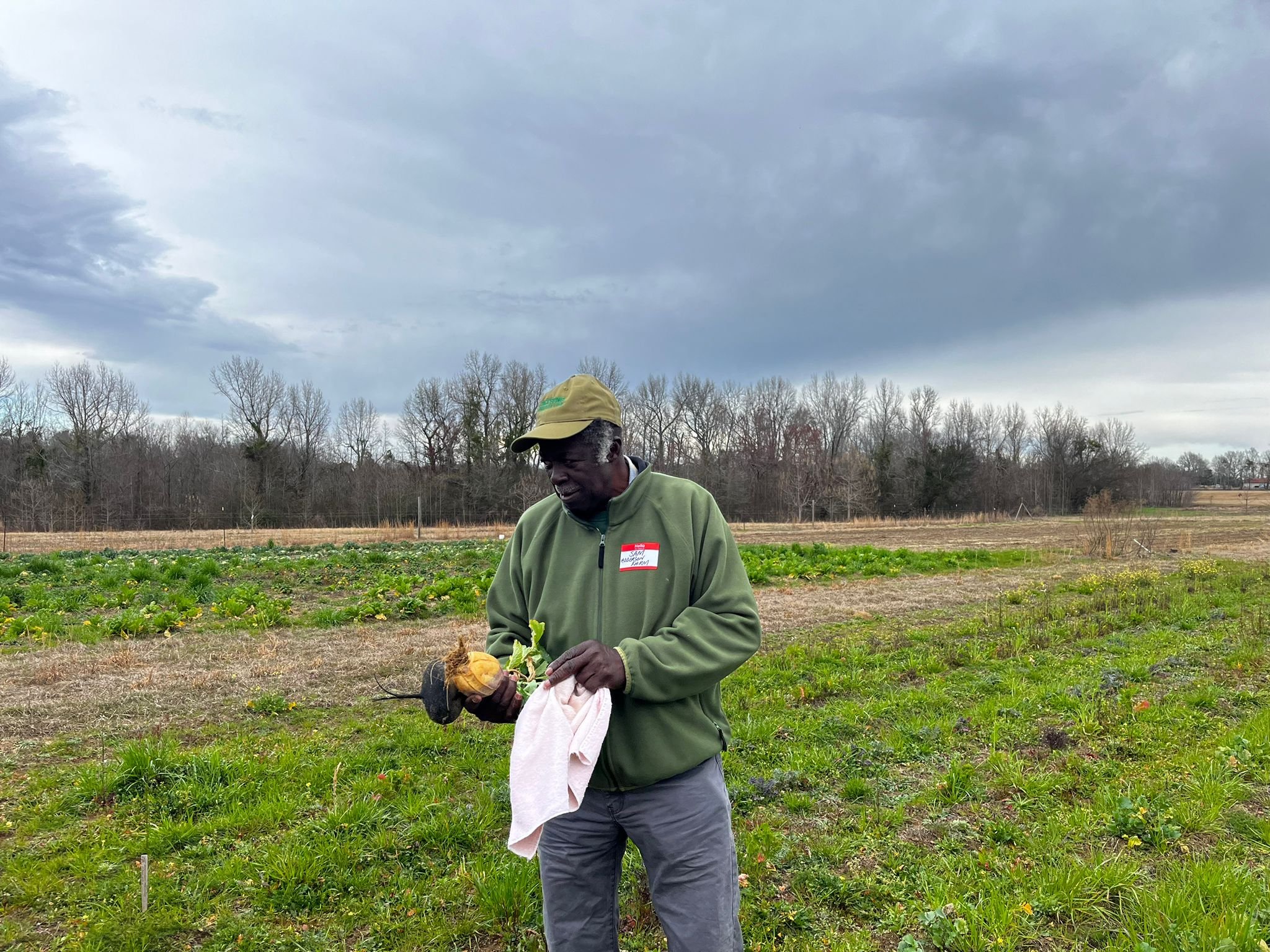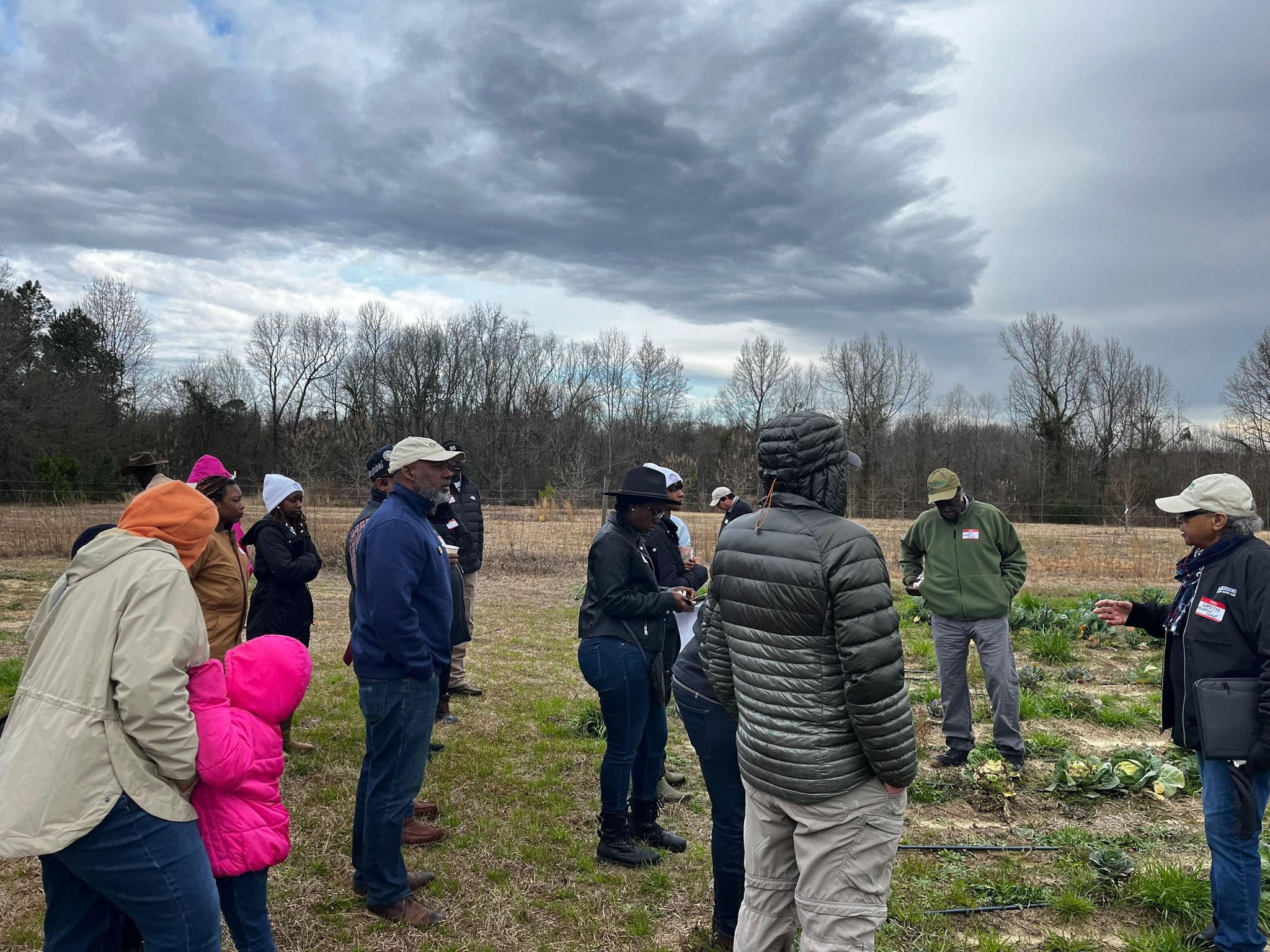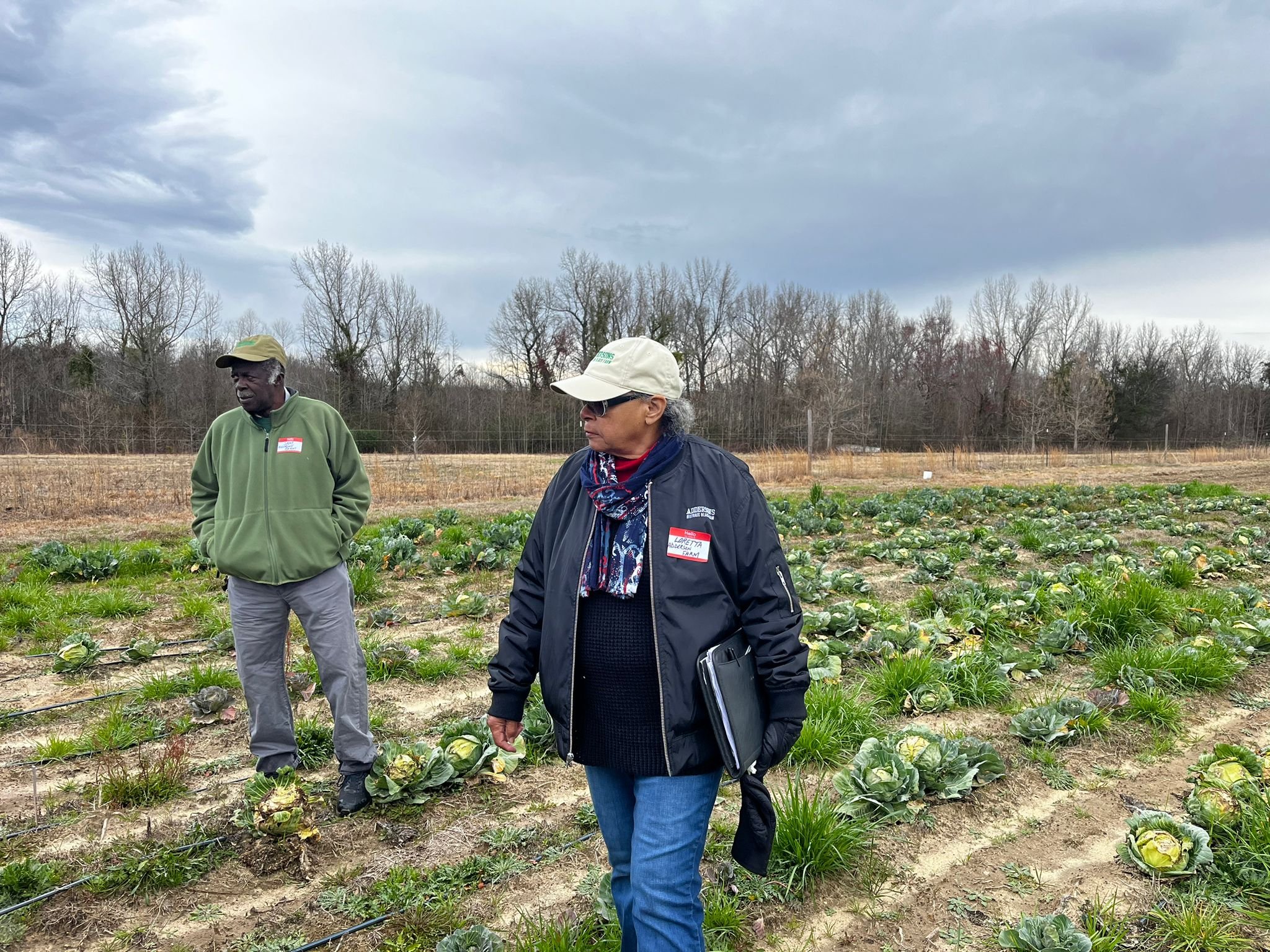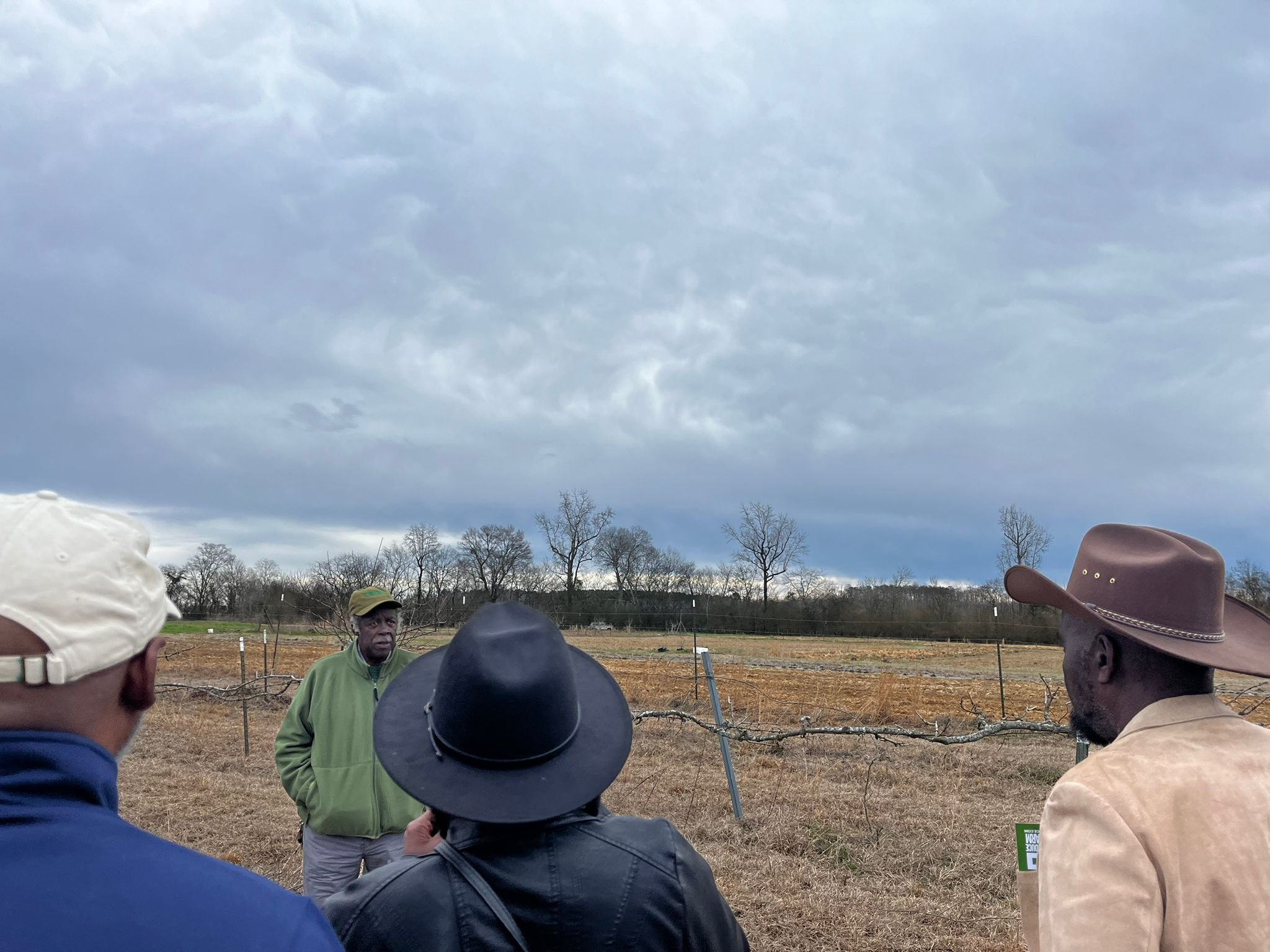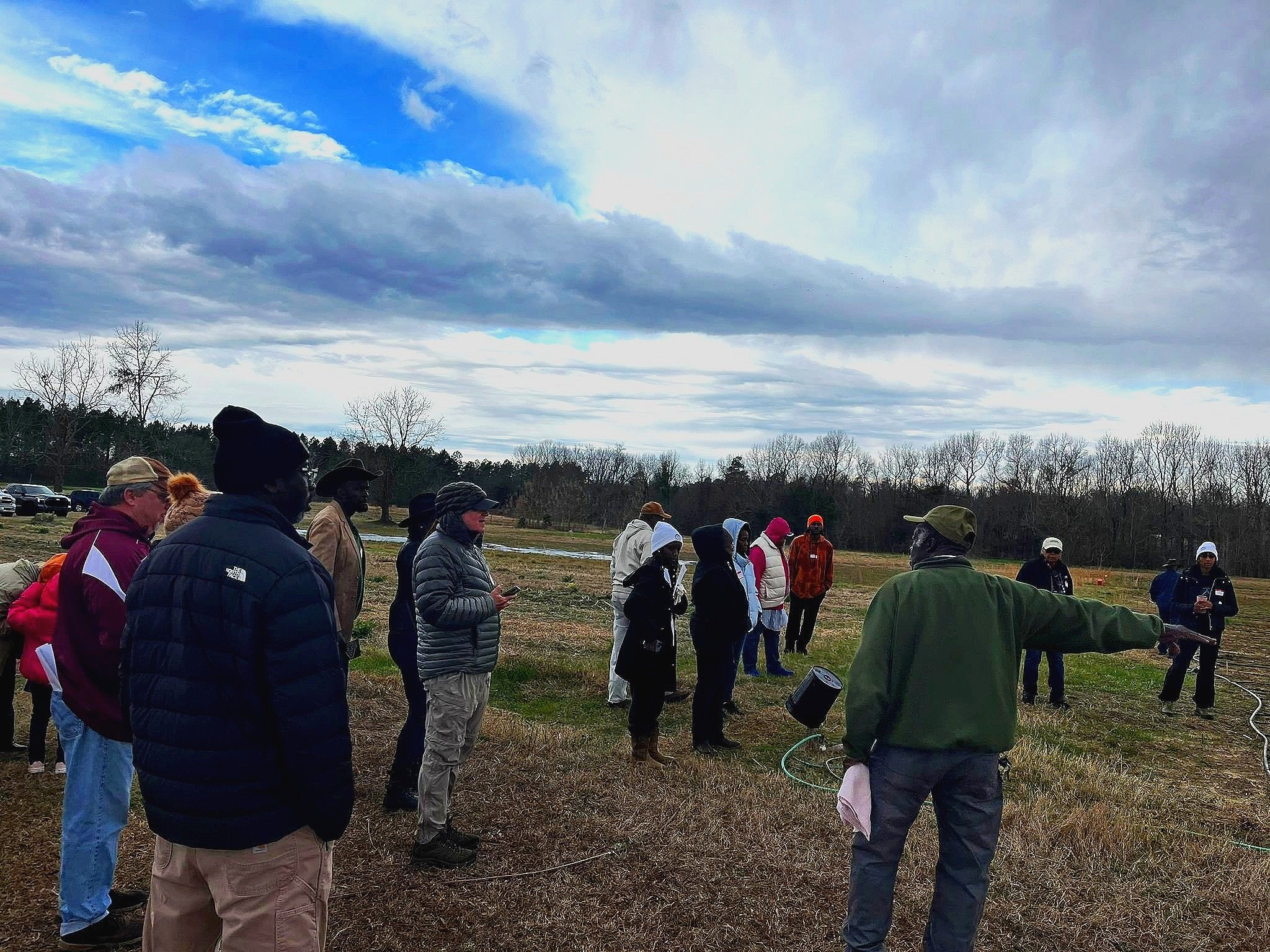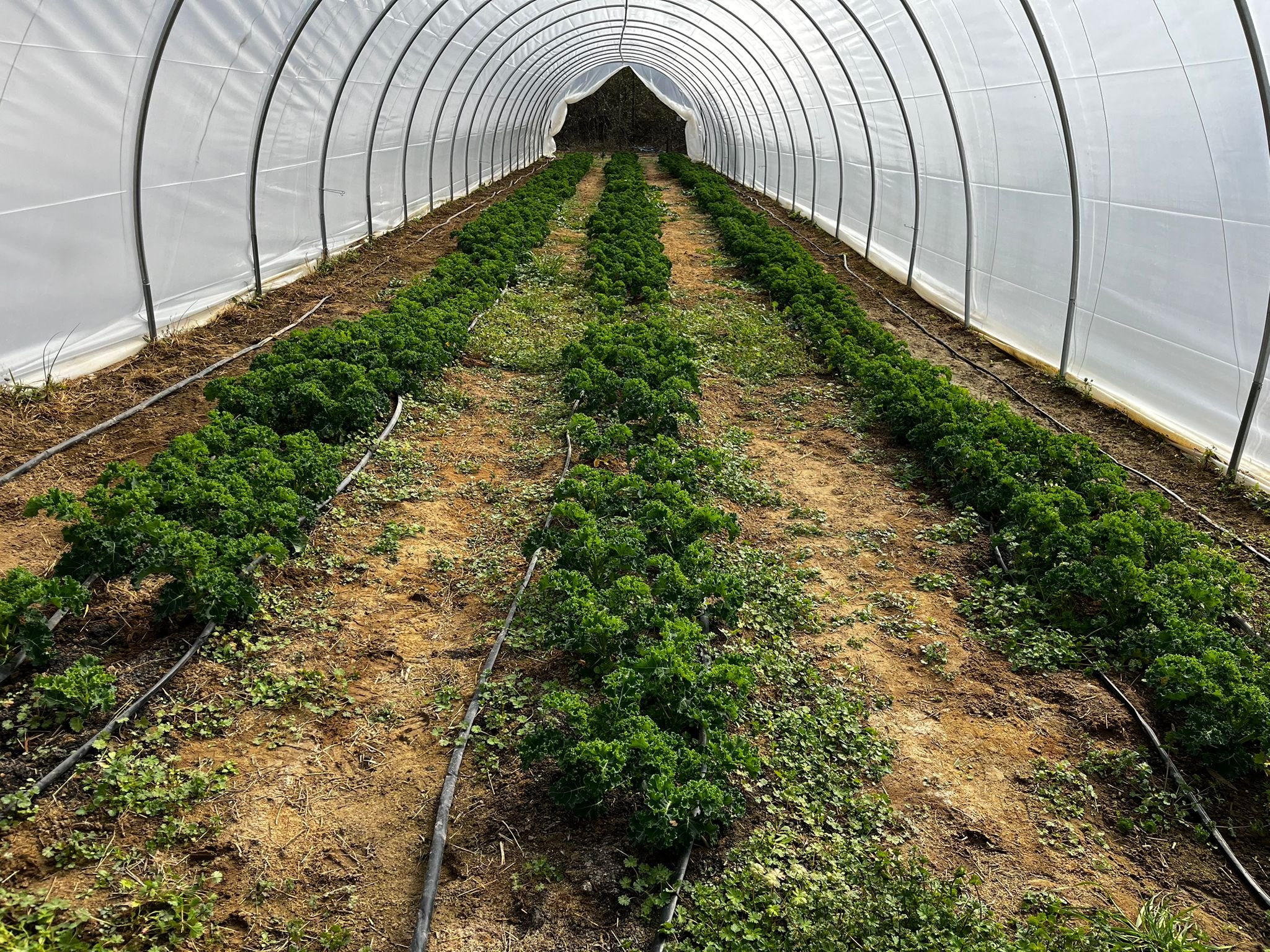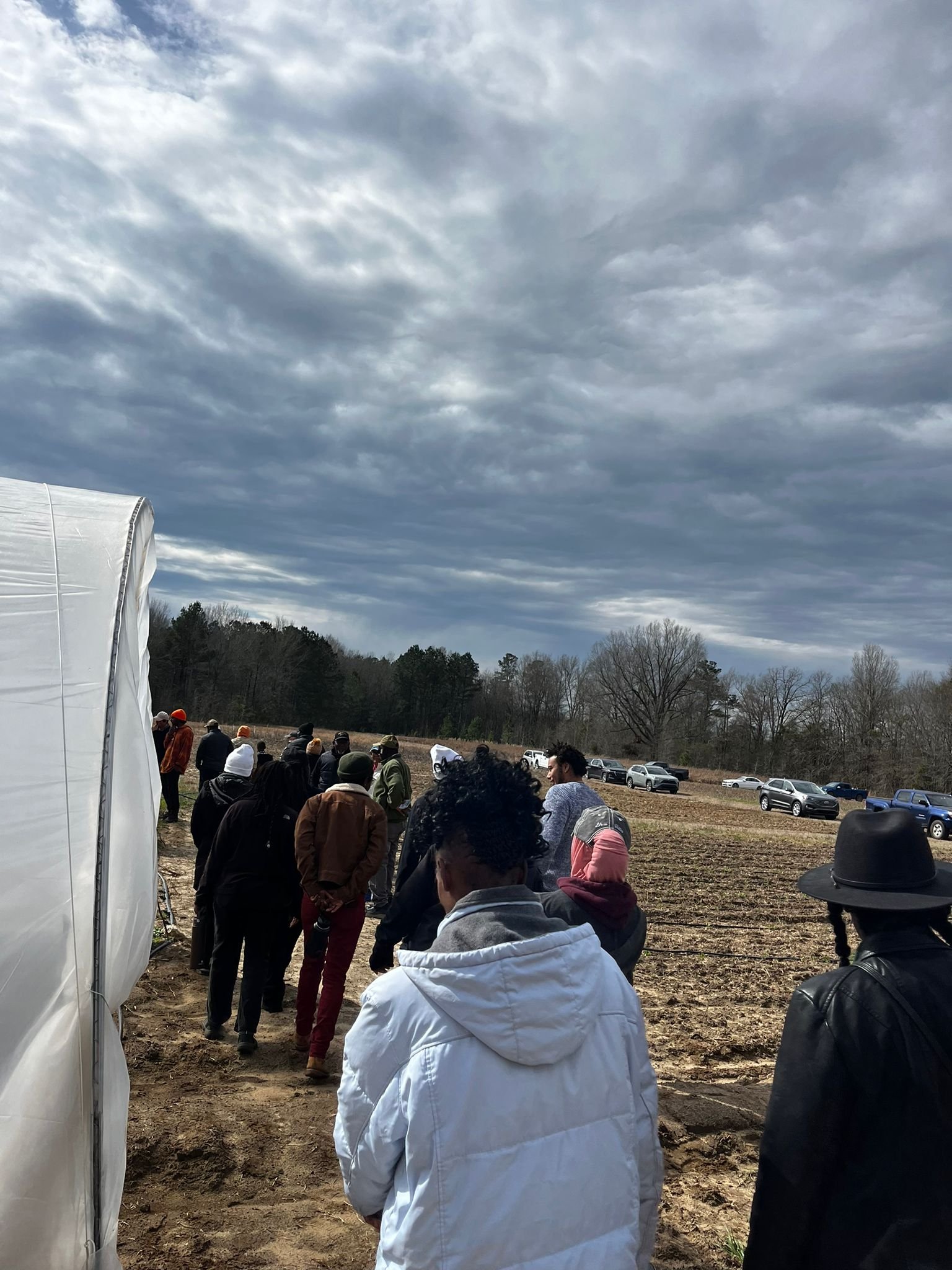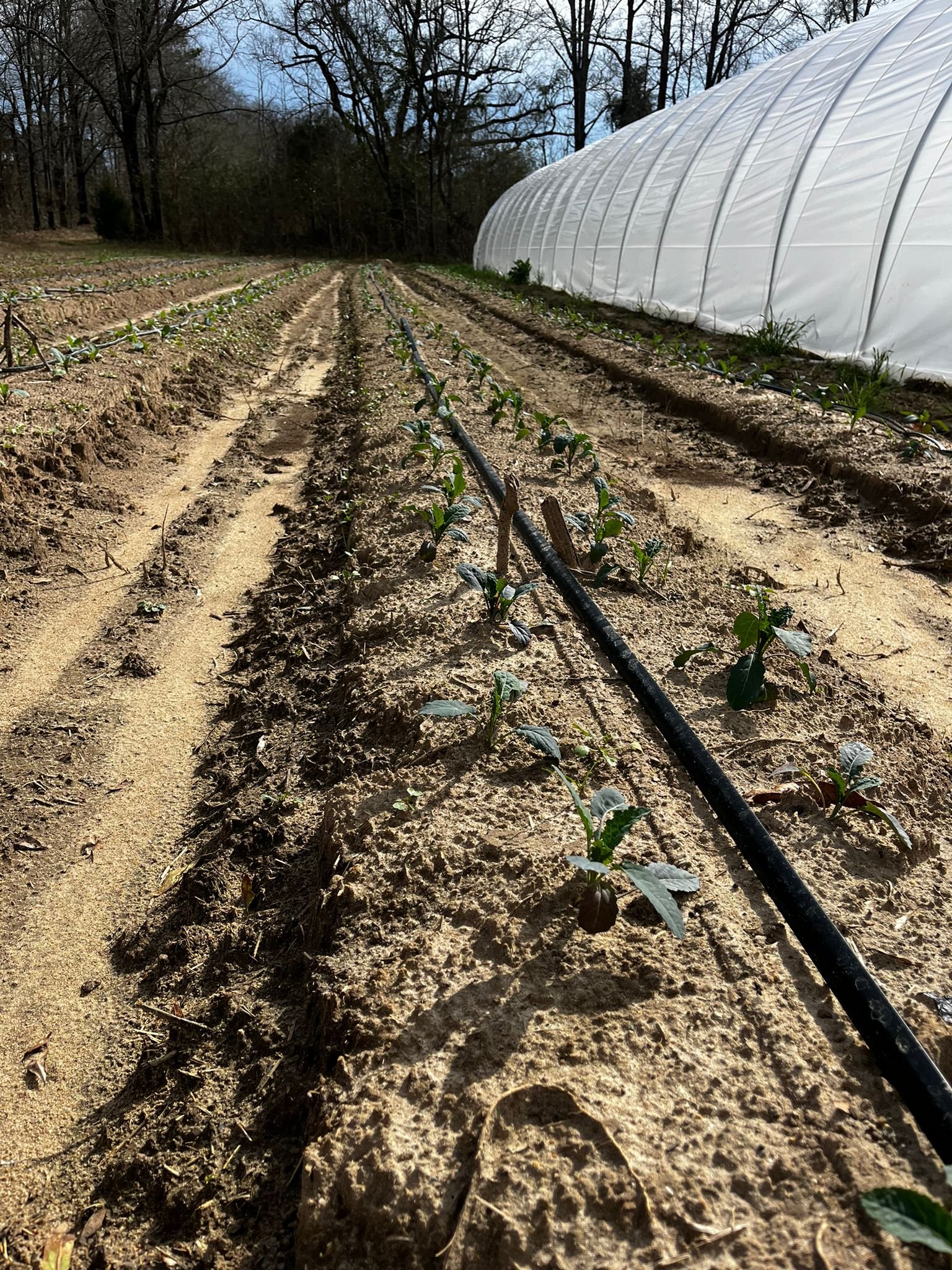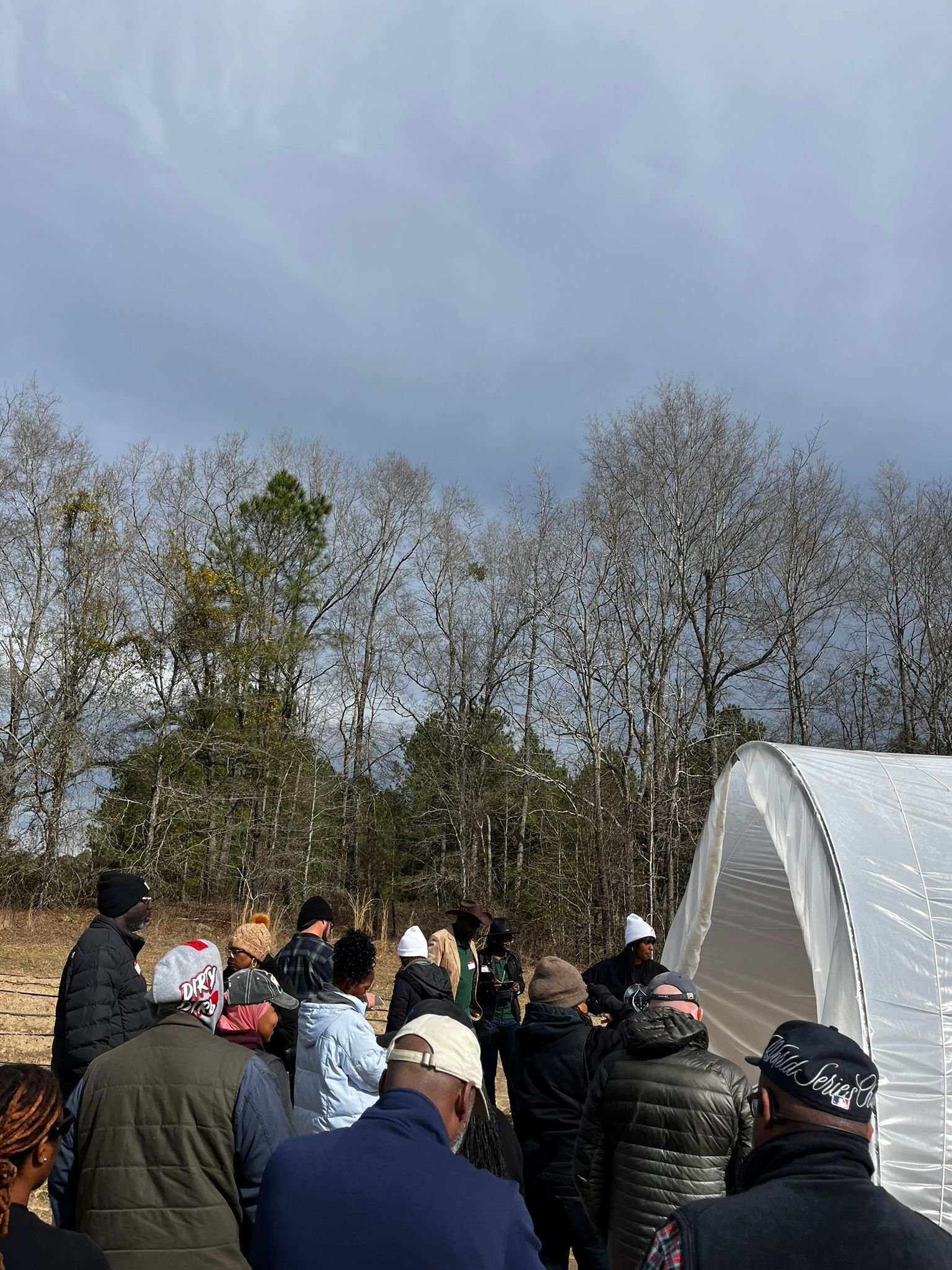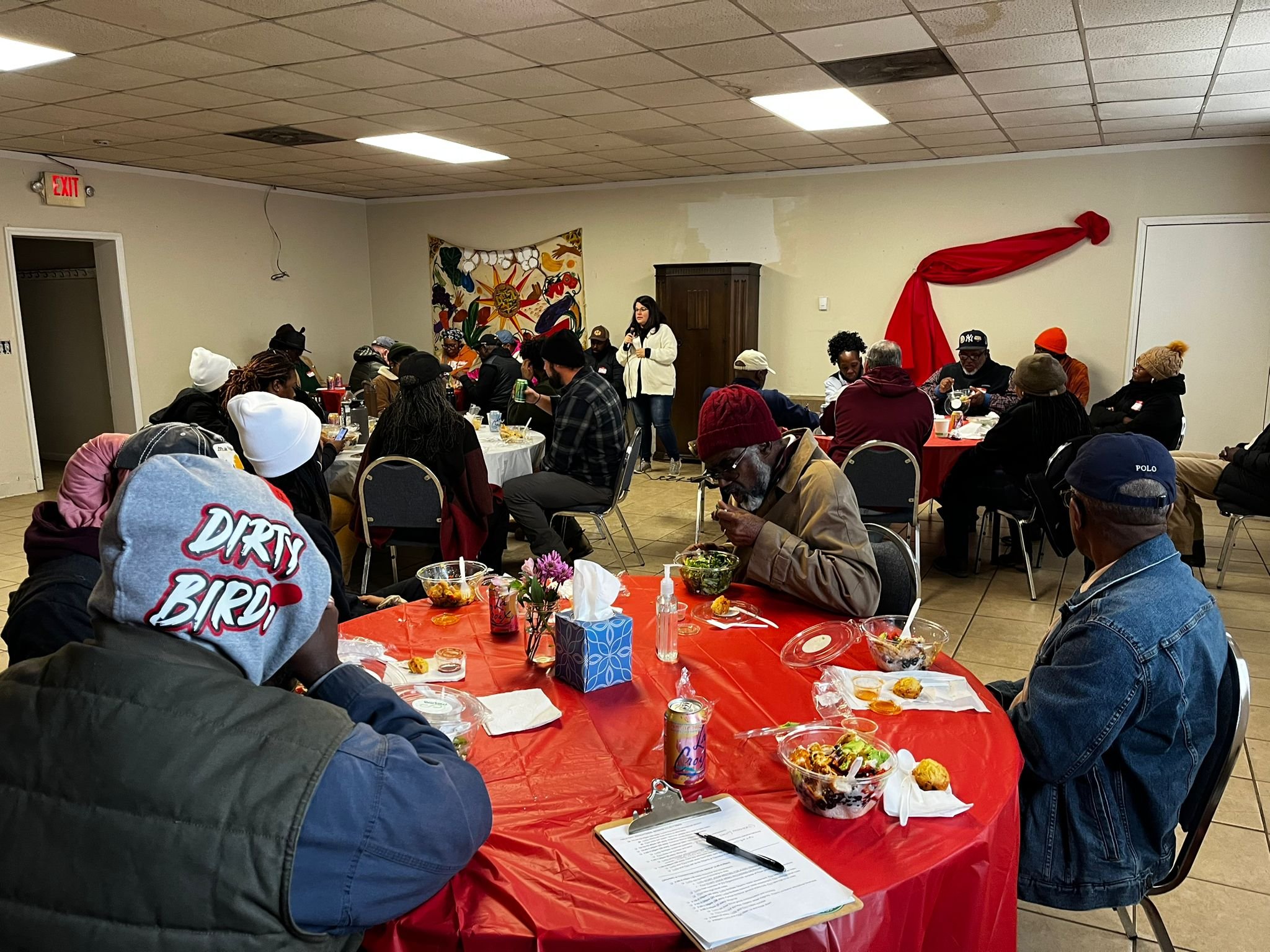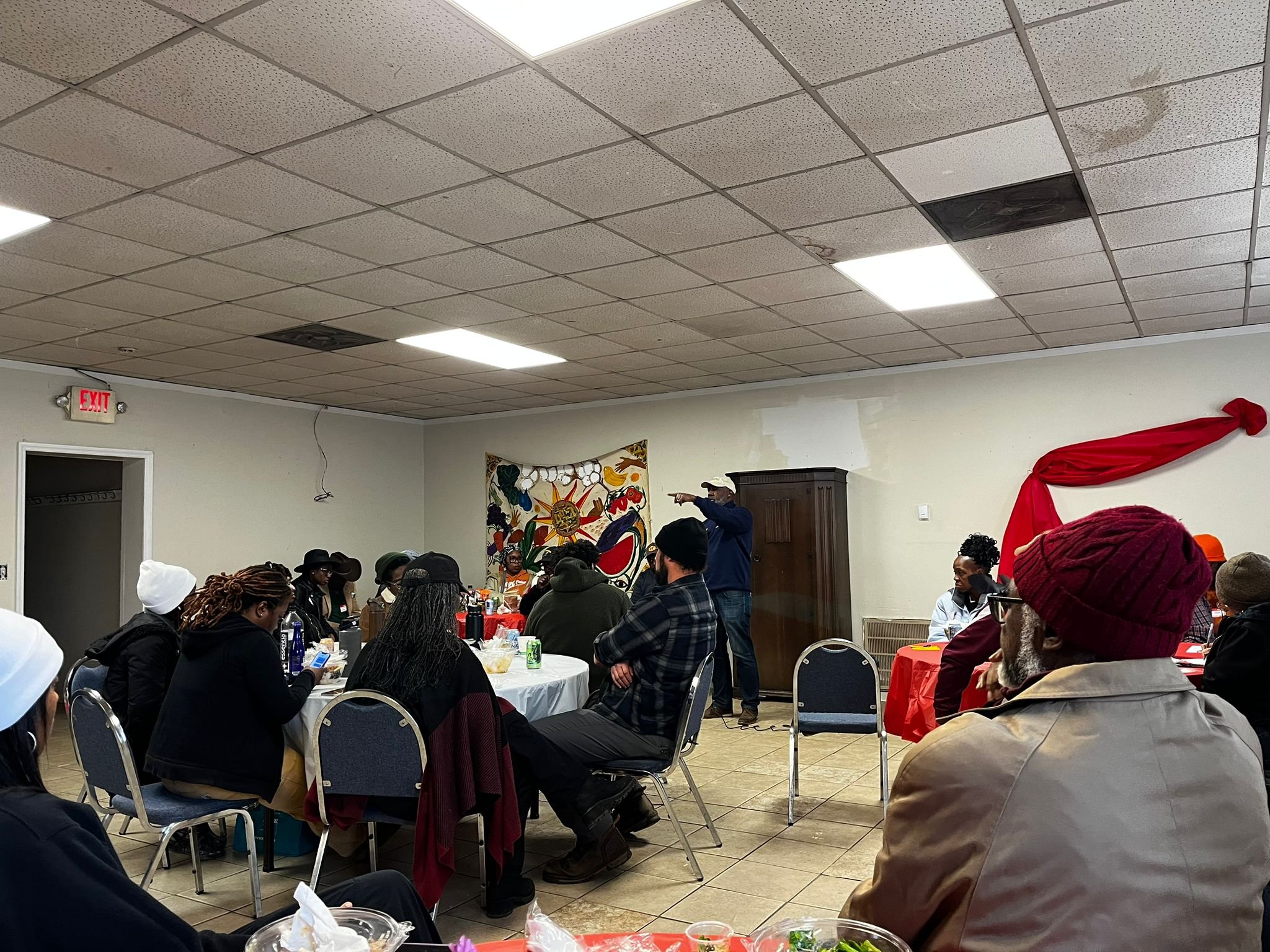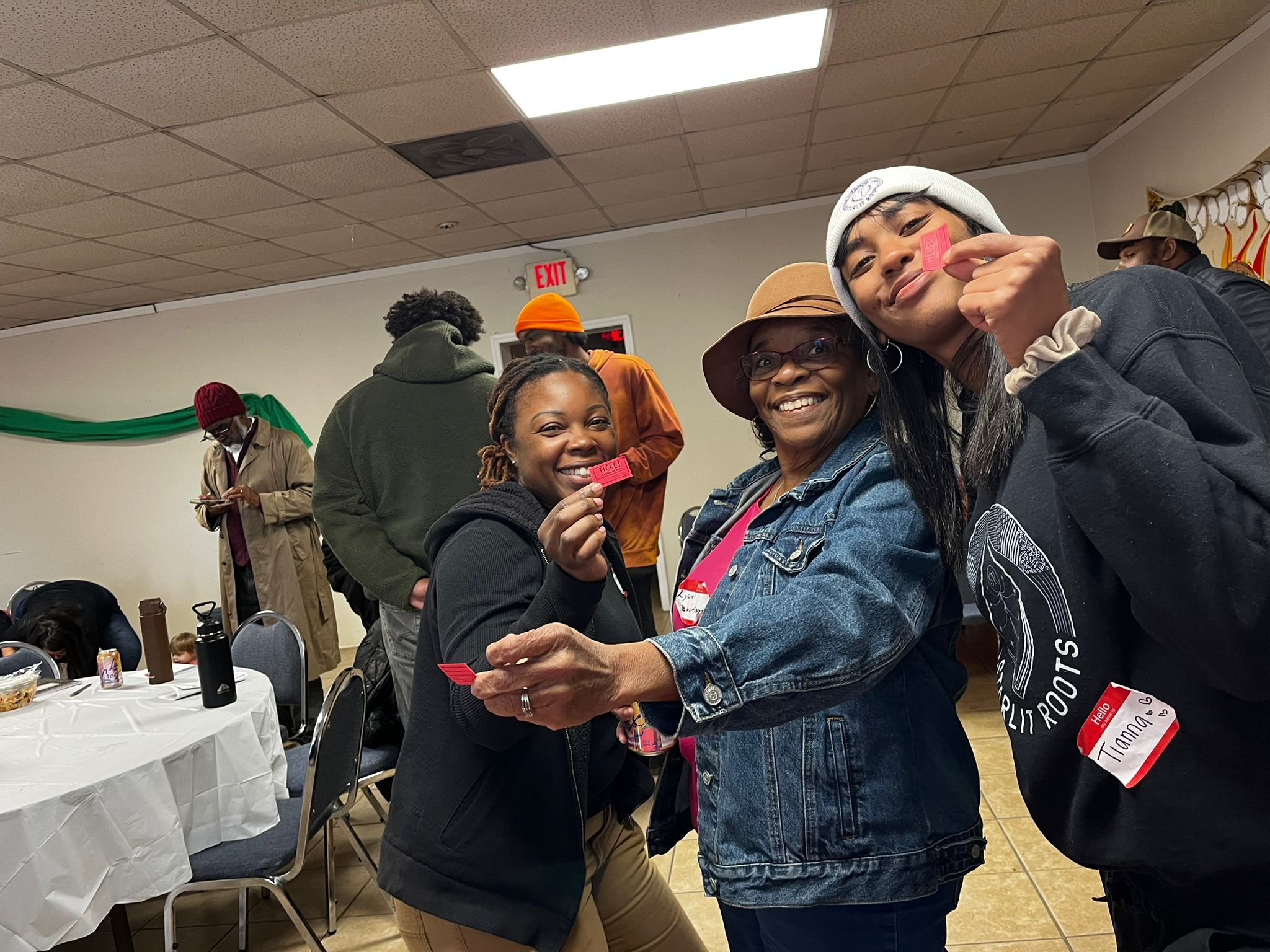By Paul Sorah
Paul Sorah is Georgia Organics’ Climate Smart Agricultural Specialist.
On February 19, 2024, Georgia Organics kicked off the Winter Farmer Series with a Collective Organic Purchasing and Accessing Organic Markets Organic Growers Farmer Field Day in Keysville, Georgia. Adderson’s Fresh Produce and Starlit Roots were our farm hosts with lunch and educational sessions at the Boggs Rural Life Center to follow. These educational workshops are part of the Farmer Services GO Organic! program that provides a portfolio of services geared specifically towards transitioning and Certified Organic farmers. This Farmer Field Day, in particular, highlighted the strength that collective farming and selling models have in accessing more markets.
First Stop, Adderson’s Fresh Produce
The first stop of the morning was at Adderson’s Fresh Produce where Sam and Loretta Adderson grow certified-organic vegetables, fruits, and herbs. Sam and Loretta bring a passion for organic agriculture that extends far beyond their own farm business. The Adderson’s dream of starting a farm together on the land that Loretta grew up on became a reality nearly 20 years ago, and they’ve used the opportunity to cultivate a culture and community around mentorship that extends generations. It is not uncommon to hear farmers from the area speak of the profound impact that the Adderson’s have had on their lives. This type of connection and community, the Adderson’s would attest, is what allows a cooperative system to function most efficiently and effectively.
Loretta Adderson greets the attendees for the farm tour. Photo by Lydia Hsu
Loretta reflected on the joy her father must feel seeing all the generations of farmers gather on the farm that morning as she guided attendees through the rows of snap peas and turnips planted in the front field. Sam talked about the irrigation system and valve placements where he uses buckets to mark the underground valve box locations. The Adderson’s received assistance from the National Resources Conservation Service (NRCS) for their farm irrigation well through the Environmental Quality Incentives Program (EQIP). Sam also mentioned that UGA provided technical assistance in developing the farm’s layout of 100’ x 100’ blocks.
As the tour continued, the group walked by the beehives and noted that they were now empty due to an infection that wiped out the hives, something that has become a more frequent occurrence with honeybees. The farm tour transitioned to the back fields of the property where Sam and Loretta showed an over-wintered cabbage planting as well as a black Spanish radish crop that functions as a cash crop and a soil cleanser. Although Sam and Loretta disagree on tilling frequency, they concur that this is a great time of year to start planting heavily. During this window, the plants are growing faster than the weeds, making it possible to grow hearty stands before the weeds and cultivation tasks overrun the operation. When it comes to the field prep and planting, Loretta creates labels for all the plantings and lays them out in the field accordingly. Sam then goes in with his tractor to complete the field prep system. This is a key function in maintaining traceability and crop plans, a major part of record keeping and Organic Certification requirements, but also a practical exercise in teamwork for Sam and Loretta.
The tour ended with Sam talking through his muscadine pruning and maintenance system and a pass through their potato field tucked away for the winter.
Sam and Loretta show the group their field crops. Photo by Lydia Hsu
Second Stop, Starlit Roots Farm
For the second farm tour, the group arrived at Starlit Roots where Tianna Neal grows on 6.5 acres and produces Certified Organic vegetables and herbs. Like most farmers in this area,
Tianna’s story is intertwined with the Adderson’s. After meeting Loretta at an Urban Agriculture Workshop in Augusta, Tianna interned on the Adderson’s farm, learning intently from Sam and Loretta about organic farming practices along with the finer details of Organic Certification and the business of farming.
Once Tianna was ready to start her farm, there was a path to land access thanks to the forward-thinking of Loretta’s great-great grandfather. Before his death, he left over 1,200 acres of farmland to his wife’s settlement that was then transferred to the Boggs Academy. Recognizing the barriers to land access that farmers face, particularly Black farmers, the Adderson’s and the Boggs Rural Life Center work to offer land, mentorship, and the opportunity for young and beginning farmers like Tianna to launch their own farm businesses in Augusta.
Tianna welcomes attendees to her farm. Photos by Lydia Hsu
Tianna began the tour showing two caterpillar tunnels that were built last year and walked through some of the early spring field plantings. Kale filled one house and the other was prepped for planting, while the field crops included snap peas, collards, lettuce, cabbage, and carrots.
Between her caterpillar tunnels, space is saved specifically for herb production. Herbs are a family affair; her sister’s passion lies in creating herbal tinctures, ceremonial preparations, and medicinal products.
Tianna went into detail about how she executes her bed preparation system. A plastic mulch layer attachment is used in the late fall/winter to raise the beds, but she chooses to leave out the plastic since the weed pressure is not as intense. Tianna took time to show the group two different field blocks in the same location. One block had not grown a cover crop while the other block had. After recent soil testing there was a noticeable difference in increased potassium and phosphorus along with other available micronutrients in the block that received the cover crop planting and acclimation. Cover crops are key factors in organic systems as they provide nutrients and organic matter for soil health, prevent erosion runoff, provide weed suppression, and create habitats for beneficial insects and pollinators.
Selling and Buying Collectively
Cooperatives can look like many things and work in many different ways. In 2023, Starlit Roots, the Adderson’s, Dface Farm, and Brown’s Place Farm established a buyer's cooperative to organize bulk farm supply purchasing. This allowed them to get better prices and shipping rates on their orders and benefit from buying irrigation supplies, soil amendments, pest and disease management products, and packaging materials together. Their collective spirit didn’t stop there. Now the cooperative is entering year two in growing together on an additional 7.5-acre field, combining resources and labor to produce larger crop plantings in higher demand for retail and wholesale outlets in Augusta and beyond.
As a cooperative, each farm can sell their products through local farmers markets as well as The Common Market Southeast, where the produce is then distributed to local school systems and other institutions throughout Georgia.
Tunnel and field production from Starlit Roots. Photos by Lydia Hsu
Augusta Locally Grown and The Common Market Southeast
To close out the Organic Growers Farmer Field Day, the group transitioned to the Boggs Rural Life Center where there was lunch, educational sessions, and farmer to farmer networking opportunities. Rebecca van Loenen from Augusta Locally Grown spoke to attendees about the sales outlets available through their organization. Since its founding in 2018, Augusta Locally Grown has facilitated over a million dollars in sales for local farmers and provided 150 families with vegetable prescriptions and educational programming.
Augusta Locally Grown hosts an online farmers market with multiple pick-up locations and days along with in-person markets throughout the week in and around Augusta.
Bill Green from The Common Market Southeast (Atlanta, GA) also joined the Farmer Field Day and spoke about the partnerships his organization/aggregation business is trying to build with farmers and institutional buyers like hospitals and universities around values-based procurement. Bill spoke about his desire to crop plan with farmers on specific crops in demand and how he could facilitate purchase contract agreements with his buyer-partners. He mentioned the trend towards more institutions purchasing from local farms that are using regenerative, climate-smart, and organic practices. The importance of realistic crop planning, farmer communications, responsible projections, and building farm systems that allow for more aggressive wholesale price points were the main topics that closed out the conversation. The Farmer Field Day concluded with open networking for farmers and a raffle drawing for tickets to the SOWTH 2025, a new regional conference hosted by Georgia Organics in February, 2025.
Photos by Lydia Hsu
WE’RE PROUD TO PARTNER WITH GEORGIA FARMERS
Thank you to Adderson’s Fresh Produce and Starlit Roots for hosting this Organic Growers Farmer Field Day and providing an environment conducive to community building, networking, and conversations around cooperative farming models for the group.
To learn more about Adderson’s Fresh Produce, visit www.addersonsfreshproduce.com or follow them on Facebook.
To learn more about Starlit Roots, follow them on Facebook and Instagram.
Thank you to the Boggs Rural Life Center for providing a space to gather for lunch, learning, and connection.
And thank you to Augusta Locally Grown and The Common Market Southeast for speaking on behalf of finding farmers new markets and ways to expand their business.
Visit Augusta Locally Grown at www.augustalocallygrown.org and The Common Market Southeast at https://www.thecommonmarket.org/locations/the-common-market-georgia.
Are you a current Certified Organic grower in Georgia? Visit Georgia Organics’ GO Organic! page for cost-share resources and more information on joining the Georgia Certified Organic Network (GCON).
This Organic Growers Farmer Field Day is supported through the United States Department of Agriculture (USDA) Transition to Organic Partnership Program (TOPP). TOPP is a program of the USDA Organic Transition Initiative and is administered by the USDA Agricultural Marketing Service (AMS) National Organic Program (NOP).”



